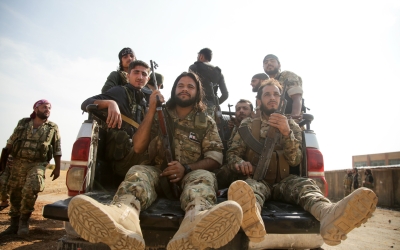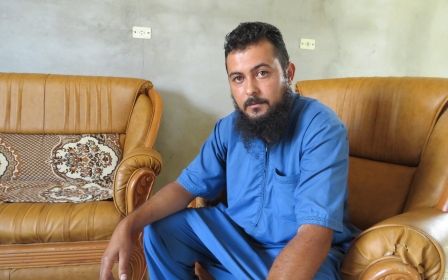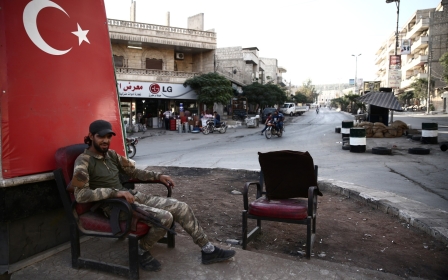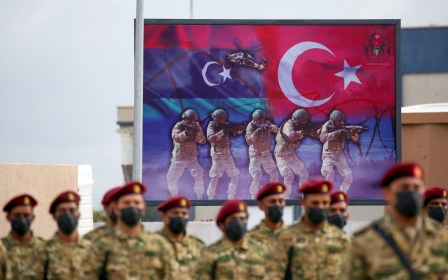Syrian mercenaries: New report reveals predatory recruitment tactics

A new study has shed light on the predatory, exploitative practices involved in the recruitment of Syrian mercenaries by foreign powers, including Turkey, Russia and Azerbaijan.
Since 2019, thousands of Syrians have been recruited as mercenaries by Turkey and Russia - the two principal foreign brokers in Syria’s bloody, decade-old war - to fight in proxy wars across the region. Syrian mercenaries have since been involved in conflicts in Libya and Nagorno-Karabakh in 2020.
On Thursday, the Syria Justice and Accountability Centre (SJAC), in collaboration with Syrians for Truth and Justice (STJ), released a study with new field research, examining the various methods used to hire Syrian mercenaries. These included: defrauding families, extremely low or unpaid wages, and recruitment from vulnerable groups such as the displaced and children.
The report’s findings highlight the relationship between war economies and ongoing human rights violations in Syria and foreign conflicts, and is based on digital forensic investigative work, field interviews and open-source information.
The 34-page report includes testimonies from Syrian mercenaries.
A fighter from the Levant Front told researchers that it was poor living conditions rather than ideological commitment that drove him to enlist for Nagorno-Karabakh: “I have many children, and my daughters have grown up without me being able to provide for them. [Here in Syria] the Levant Front pays me just 400 Turkish lira every 50 days, so I decided to go to Azerbaijan to secure a decent and dignified life for my family.”
Another fighter recounts how he was sent to Libya with a brigade from the opposition Syrian National Army’s Sultan Murad Division, and explains how top officers tried to seize the mercenaries’ wages.
"We went three months without being paid, and after we each asked for an advance of $300, they only gave us 100 and kept the rest," the fighter testified.
The report also unearthed new evidence of child recruitment.
Researchers interviewed the family of a fighter by the name of ‘A. ‘Uthman, who was killed in Libya in May 2020 at the age of 19 but was initially recruited when he was still a minor.
A member of ‘Uthman’s family said that “his poor mother took the news of his death very hard. He had spoken with her twice from Libya, to tell her that he was going to secure a better life for her”.
The growing use of mercenaries
The authors of the study say that their analysis should be seen in light of two main phenomena.
The first: the growing popularity of mercenarism among regional and international powers as a means of displacing the costs of military intervention in the Middle East and North Africa onto mercenary soldiers.
The second: the scale of the humanitarian suffering across Syria that has made mercenarism one of the only feasible options of income for young Syrians whose lives have been disfigured by war and displacement.
“Rather than focus on the alleged ideological commitments of fighters that typically feature in geopolitical analyses of Syrian mercenaries, here we highlight the material desperation among fighters and their families that has driven so many to enlist for combat abroad,” reads the report.
'We went three months without being paid, and after we each asked for an advance of $300, they only gave us 100 and kept the rest'
- Syrian mercenary
“These conditions frequently have only been intensified by the exploitative nature of mercenary recruitment and compensation. It is important to document these war economies given that this predatory recruitment of mercenaries has enriched and strengthened some of the most criminal factions that make up the Syrian National Army.”
The majority of Syrian mercenaries are former anti-regime rebels who have ended up in parts of northwestern Syria under Turkish influence.
Some former members of the regular Syrian army and fighters of allied militia groups have also been sent by Russian military players, such as the shadowy Wagner Group.
During Libya's most recent April 2019-June 2020 conflict, Turkey supported the UN-recognised Government of National Accord while Russia backed forces loyal to eastern commander Khalifa Haftar.
Meanwhile, in the conflict that erupted last year in the disputed Caucasus region of Nagorno-Karabakh, Turkey sent fighters from its Syrian proxies to support Azerbaijan against Armenia.
Middle East Eye delivers independent and unrivalled coverage and analysis of the Middle East, North Africa and beyond. To learn more about republishing this content and the associated fees, please fill out this form. More about MEE can be found here.





